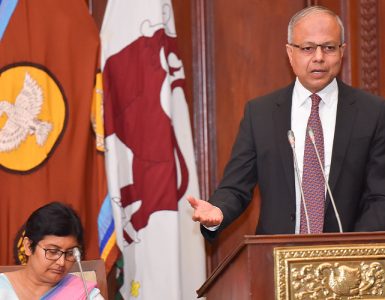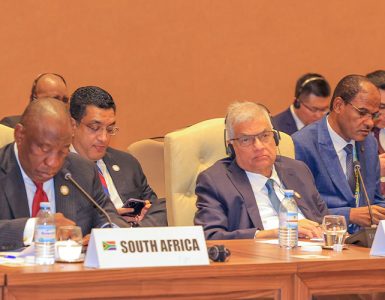Minister of Agriculture, Mahinda Amaraweera, affirmed that the need for rice imports from foreign sources is unnecessary, given the ample existing rice stocks that can sustain the upcoming Maha season. The Minister highlighted the success of the previous season, attributing it to the prompt supply of all essential fertilizer types to farmers, along with financial concessions, and robust yields in regions unaffected by drought further contributing to the season’s prosperity.
Addressing an expert gathering organized by the President’s Trade Union Relations Division at the Presidential Secretariat yesterday (23) on the subject of ‘Modernization of the Agro-Industrial Sector and its Challenges,’ Minister of Agriculture Mahinda Amaraweera elaborated on the agricultural landscape. He conveyed his perspectives on the imperative of enhancing the agro-industrial domain to meet contemporary challenges.
These insights underscore the Ministry’s dedication to optimizing the agricultural landscape while affirming the nation’s ability to meet its rice requirements through robust domestic resources.
Minister Mahinda Amaraweera further elaborated on the matter, stating:
“At the commencement of President Ranil Wickremesinghe’s presidency, a pivotal challenge was to strengthen farmers’ engagement with agricultural land, redirecting them from protest platforms. This endeavour was initiated during a period of cultivation preparation.
Despite the target of cultivating 275,000 hectares, the unavailability of fertilizers posed a significant obstacle. While some were criticized for causing undue alarm, even the international community anticipated a potential food scarcity.
With concerted efforts, we managed to motivate farmers to return to their fields. This dedication resulted in the cultivation of 512,000 hectares during the Yala season, a decade later. Furthermore, approximately 800,000 hectares were cultivated during the Maha season.
During that particular year, our nation imported 800,000 metric tons of rice. However, the impending prospect of importing rice this year presents a significant predicament. This challenge is further compounded by India’s current embargo on rice exports.”
Minister Amaraweera’s comments underscore the difficult hurdles inherent in safeguarding domestic food security, shedding light on the particulars of organizing agricultural resource management on a global level.
“Nevertheless, owing to the accomplishments of the season and the cautious supply of all three essential fertilizers coupled with financial assistance, we possess ample rice reserves to bridge the gap until the forthcoming harvest of the Maha Season.
Furthermore, despite the current drought conditions leading to the devastation of approximately 75,000 acres, provinces unaffected by this dry weather spell are experiencing notably high yields. Consequently, there remains no necessity to resort to rice imports from other countries.
The prevailing escalation in rice prices has drawn attention and necessitates effective management. As the Minister of Agriculture, I perceive the rise in paddy prices as a positive development, yet it is imperative to avert any inconvenience to consumers.
To this end, it is vital to establish an appropriate framework for regulating paddy and rice prices. Addressing this challenge is pivotal to optimizing harvests from our limited arable land. Acknowledging inadequate farmer awareness as a contributing factor, it is evident that farmer leaders with divergent political orientations have not uniformly disseminated accurate information to the farming community.
Remarkably, the Hambantota district has demonstrated that transcending political influences in the dissemination of accurate information among farmers has yielded positive outcomes. This district’s approach has fostered growth and bountiful harvests this year.
It is emphasized that the effective transmission of accurate seed paddy information to farmers stands as a crucial prerequisite for the success of all forthcoming agricultural endeavours. Additionally, imparting knowledge about modern technologies and their associated advantages is of paramount importance. When executed proficiently, these initiatives hold the potential to yield a surplus of rice production from our paddy fields.
Undoubtedly, the dissemination of new technological insights holds immense potential. For instance, the introduction of the DJC Mango in 2018 prompted mango cultivation at a rate of 80 plants per acre. However, leveraging contemporary technologies has remarkably elevated this figure to 560 plants per acre today. Notably, the initiation of Green Cucumber exports from the Wakarai region in 2018 has generated a profit that surpasses the project’s expenditure. Similarly, the application of modern technology has yielded favourable outcomes in the cultivation of chillies, pomegranates, Anoda, and sour plantains.
Our endeavours encompass the facilitation of essential assistance through well-structured loan programs, targeting youth facing challenges in provisioning cultivation activities. In the current landscape, many farmers are disinclined to see their offspring pursuing a career in agriculture. Reversing this perspective is imperative. With this shift in mind, I hold the conviction that these initiatives will yield fruitful outcomes. By bolstering support mechanisms and encouraging younger generations to engage in farming, we aim to bring about a positive transformation in the agricultural landscape.”
Mr. Saman Ratnapriya, Director-General of the President’s Trade Union, highlighted the challenges faced during the economic crisis of the past year, including the fertilizer scarcity that ensued. “Farmers, in response, initiated protests due to the unavailability of fertilizers.
Moreover, water-related issues emerged, which were subsequently addressed and managed under the guidance of President Ranil Wickremesinghe. His intervention has led to partial resolutions of these challenges.
Concurrently, the realm of electricity presents another concern. Reportedly, an additional expense of Rs. 800 million has been incurred in this regard. Notably, dire predictions were made last year about potential fatalities due to a scarcity of food brought about by the economic crisis. However, the government’s strategic interventions managed to stave off this crisis and avert any loss of life.
In light of these circumstances, it is imperative to engage in comprehensive discussions concerning the agricultural sector’s challenges. By fostering informed dialogue, the government’s efforts towards uplifting the nation’s agricultural landscape can effectively realize success.”
Dr. Suren Batagoda, Chairman of the Presidential Committee on Food Security, emphasized the challenge of introducing modern technologies and projects in agriculture to the grassroots level. While these innovations hold promise, practical hurdles can emerge during their implementation at the village level. He stressed the need for swift dissemination of modern technologies and projects to rural areas, utilizing avenues such as village temples, schools, Grama Sevaka, Samurdhi officials, and farmer officials. The President has called upon the Farmers’ Federation officials to extend their support in this endeavour.
The President has also advised identifying families without training or qualifications and integrating them into various economic processes. As part of this initiative, these families are being strategically aligned to contribute to the economic landscape, with a specific focus on the thriving tourism industry.
During the event, Professor H. W. Cyril, Chairman of the National Livestock Board and Dr. Rohan Wijekoon, Director of Agriculture Sector Modernization Projects (ASMP), also expressed their views on agricultural modernization projects. Inclusive of farmer organization leaders, trade union representatives and civil organization activists, diverse stakeholders contributed their suggestions and ideas to the dialogue.





